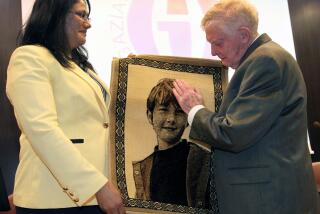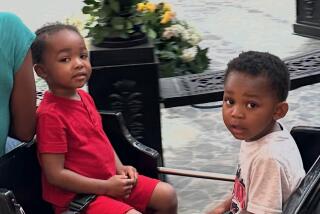Facing a Short Supply of Small Hearts
To save the lives of twins Nicholas and Nathaniel Draper, doctors will have to wait for two other babies to die.
It’s that simple, that certain and that heart-breaking. But their hearts must be kept beating if they are to save two infants born with hearts too weak to keep them alive.
“To be honest, that’s the reality -- somebody has to die for our kids to have a legitimate shot at living,” the twins’ father, Michael Draper, 33, said Monday at Mattel Children’s Hospital at UCLA, where his 2-week-old twins were taken shortly after their birth in Phoenix.
“We certainly don’t think, ‘God, please let something happen so we can have a chance.’ But nature taking it’s course, we want our boys to have a chance. We want to have them come home.”
Without replacement hearts, the twins aren’t likely to live for more than a year, their doctors say, because of a rare condition known as dilated cardiomyopathy in which the heart muscles are too weak to pump blood efficiently.
UCLA pediatric surgeons say if they receive donor hearts, they could perform what may be the first heart transplant on twin newborn infants.
But such infant-size hearts aren’t easy to come by.
Nationally, about 28,000 infants died in 2001, the latest year that statistics have been compiled. Their organs are rarely donated by their parents. In the Southern California area, 1.5% of donated organs came from infants.
The heart needs to be beating or resuscitated shortly after death. That happens when the victim is officially declared brain-dead, as is often the case with blunt trauma or drowning. Typically, the heart remains beating with the help of a ventilator.
No one can predict how long the twins will have to wait for hearts that match their blood type, O negative. There are 28 infants ahead of them on a national heart-transplant waiting list, according to the United Network for Organ Sharing website. About 65 infants’ hearts are donated each year nationwide, and about two thirds are transplanted successfully.
In Southern California only one heart has been donated this year, according to OneLegacy, the nonprofit federally designated agency that handles organ donations in the area.
“There’s not much that can fit in that little chest,” said Renee Hawthorne, chief operating officer of OneLegacy. “It’s bad enough to be waiting for a heart for one child, and they have got to wait for two. How do they decide who gets the first one?”
Doctors placed Nicholas, who was born two minutes before his twin, on the heart-transplant list soon after he arrived at UCLA.
Nathaniel has complications from bleeding on the brain and doctors are waiting for the condition to clear before putting him on the official waiting list.
Dr. Mark Plunkett, associate professor of cardiothoracic surgery and director of the UCLA Pediatric Heart Transplant program, said the donor could be up to 6 months old because the twins’ hearts are enlarged by the cardiomyopathy. “That gives us a little bit of room,” he said.
Plunkett says he’s hoping that hearts will be donated in three to six months.
“We can go on nine to 12 months, but can we keep them alive and stable and keep their other organs stable? That’s the unknown in the equation,” he said. “All we can do is raise awareness that we’re in dire need of one or two hearts and hope they become available.”
Doctors don’t know what caused the twins’ rare condition, which is particularly unusual in twins.
The Drapers, who also have 4-year-old twins, say both sets of twins were conceived naturally. They learned 30 weeks into the pregnancy that the fetus’ hearts appeared to be enlarged. Two weeks later, Nicole Draper went into premature labor and spent five weeks in the hospital before giving birth to the twins.
They barely had time to look at them before the babies were whisked away to a larger hospital in Phoenix, then to UCLA.
Two days after giving birth, Nicole Draper propped two pillows on the front passenger seat of their Toyota Previa van, put her feet on the dash, and settled in for the hot, six-hour drive to Los Angeles. They arrived at UCLA at 3 a.m., and visited their sons.
Their other children, Caitlin, 5, and twins Brendan and Emma, followed the next day with relatives.
The Drapers, whose insurance has covered much of the babies’ care, had been living out of hotels and recently moved to the Ronald McDonald house in Los Feliz.
Michael Draper will be commuting on weekends from Phoenix, where he recently started a full-time job as an enrollment counselor at the University of Phoenix. Nicole Draper has given up the child-care center she ran at her home.
She is planning to stay in Los Angeles indefinitely and plans to enroll Caitlin in kindergarten here.
Meanwhile, the couple, who seem steady and unflappable, say they are relying on each other and their strong Mormon faith to get through difficult times.
“We have a strong relationship -- that’s very important, to have a partner to lean on,” said Nicole Draper.






